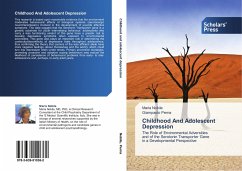This research is based upon reasonable evidence that the environment moderates behavioural effects of biological systems (serotonergic neurotransmission) involved in the development of juvenile affective symptoms. The data suggest that the Serotonin Transporter gene is a genetic substrate for youth internalizing behaviour: adolescents who carry a less functioning variant of this gene have a greater risk to develop depressive symptoms when exposed to environmental adversities. This gene also plays an important role in determining the continuity/discontinuity of depressive traits throughout adolescence, thus confirming the theory that carriers of the less efficient allele have more negative feelings (about themselves and the world), which could turn into depression when under stress. Primary prevention strategies, promoting proactive and adaptive coping behaviours may reduce the likelihood of persistence of behavioural problems from early- to late-adolescence and, perhaps, to earlyadult years.
Bitte wählen Sie Ihr Anliegen aus.
Rechnungen
Retourenschein anfordern
Bestellstatus
Storno








